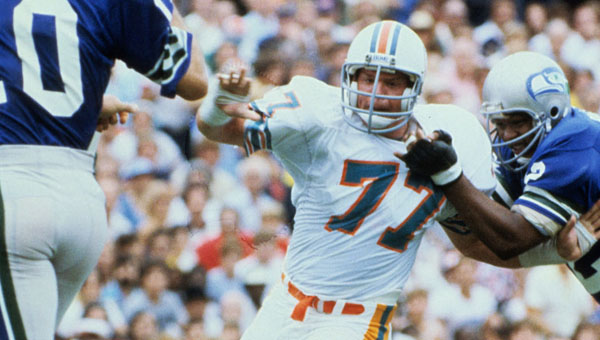ESJ hosting A.J. Duhe presentation Monday
Published 12:03 am Saturday, April 2, 2016

- Reserve native A.J. Duhe spent eight seasons as a defensive player for the Miami Dolphins, playing in two Super Bowls. He will present East St. John High with one of the NFL’s golden footballs commemorating his Super Bowl participation. (Courtesy of Miami Dolphins)
RESERVE — His parents used to call him “Cottontop,” because his light hair was always bleached blonde by the sun from playing outside so much.
His brother used to call him “J-Boy,” because the nickname A.J. just wasn’t short enough, perhaps.
His Miami Dolphins teammates in the 1970s and 80s used to call him “School Boy,” because he never liked to break the rules about curfew and such.

Former Leon Godchaux defensive standout A.J. Duhe Jr., middle, sits with his parents Ann Duhe, left, and A.J. Duhe Sr., right, as he signs his grant-in-aid scholarship to LSU in 1973. (Courtesy of Gerald Keller)
His name is Adam Joseph Duhe Jr., “A.J.” for short, though he often still is called “The Reserve Boy” who excelled at football at the defunct Leon Godchaux High School, then at LSU and for eight seasons in the NFL with the Miami Dolphins.
On Monday he will likely be called a local hero as he returns home to officially present to the community one of the NFL’s golden footballs.
To mark the 50th anniversary of the Super Bowl, the NFL has awarded thousands of golden footballs to coaches and players who have participated in Super Bowls. They, in turn, present the footballs to their former schools and/or communities. Since Godchaux burned down in the 1980s, Duhe is presenting the ball to East St. John High.
Actually, the school has had the ball since January and featured it prominently during the school’s festivities on National Signing Day, but Monday is officially A.J. Duhe Day at the school. A program will be held at 12:30 p.m. Monday in the school’s gym. St. John the Baptist Parish Schools Superintendent Kevin George, School Board member and local sports historian Gerald Keller and East St. John football coach and Athletics Director Alden Foster are scheduled to speak, as well as Duhe.
Keller laments that most of the students who will attend Monday’s event probably won’t know who Duhe is or all that he accomplished.
“That was all the way back in the 70s,” Keller said. “They won’t know who he is.”
Keller, however, well remembers the good-looking kid who mumbled a lot, but was a spectacular football player.
“He was so good, he was going to the junior high and the coach at the high school used to pick him up and drive him to school,” Keller said. “Then he would ride the bus home. There was a time when everyone knew who A.J. Duhe was.”
Longtime New Orleans sports writer Bill Bumgarner knew who Duhe was, even though the downtown papers didn’t cover the area.
“He was a tremendous defensive player,” Bumgarner said. “Very quick, very tenacious, very strong. He was one of the bright spots at LSU during the McClendon era. He was pretty funny too, with a good sense of humor.”
Duhe said he still hopes to deliver a message to the students.
“I don’t know what I’m going to say yet,” he said. “I guess, I’ll tell them not to give up on their dreams. Everybody has a dream. I guess I had a dream.”
Duhe used to dream he was Johnny Unitas when he was a kid playing sandlot football with his friends in Reserve.
“Everybody wanted to be the quarterback,” he said. “I was always the quarterback. Back then, coaches played kids by their size and I was always too big to be the quarterback. Back then, the quarterback was the little guy who couldn’t do too much. You look at guys like Ben Roethlisberger. He’s a big guy. I might have been the first Ben Roethlisberger.”
Instead, Duhe was a light-footed defensive tackle at LSU from 1973 to 1976, averaging 72 tackles per season for Charlie McClendon’s Tigers. He was a first-team All-SEC pick in 1976. He also was a two-time Academic All-SEC selection.
Drafted by Miami with the 13th pick in the first round of the 1977 NFL draft, Duhe spent eight seasons with the Dolphins, where he was converted from defensive lineman to linebacker by then-defensive coordinator Bill Arnsparger. He was named the NFL’s Defensive Rookie of the Year in 1977 and earned All-Pro honors in 1981 and 1983. He was selected to the 1984 Pro Bowl and played in two Super Bowls.
Duhe is most well-known for his performance in the 1982 AFC Championship Game against the New York Jets, during which he nabbed three interceptions, returning one for a 35-yard touchdown. Miami won the game 14-0 to advance to Super Bowl XVII.
He was inducted into the Louisiana Sports Hall of Fame in 2001.
“I have a lot of great memories,” said Duhe, who now works for Caesar’s Entertainment Industries (which oversees the New Orleans Harrah’s Casino) and lives in a suburb of Ft. Lauderdale.
“I just really enjoyed being in a team environment, working together for a common goal. I remember a lot of the games, some of the communities I played for. It was just a dream come true.”
Duhe’s career was hampered and ultimately shortened by injuries. He underwent nine surgeries to his shoulders, knees and wrist.
“The last year or two I suffered some pretty serious injuries,” Duhe said.
“I rehabbed a lot those last two years. Back then it was different. Now you get injured you get treatment and get time to come back. Back then it was, ‘Come on. Get back out there. You gotta play.’”
Being released before the 1985 season was a tough blow, Duhe said.
“I had an opportunity right after I played my last game,” Duhe said.
“Bill Arnsparger offered me a chance to come back to LSU. He wanted me to coach. But I was 29. I was only out of the game four or five months.
I kept thinking I’d just rehab and get myself back to the game. I was young. I was tough. That might have been a missed opportunity. Who knows, I might be a head coach somewhere. I might be the head coach at LSU.”
Duhe settled in Florida with his college sweetheart wife Francis.
They have raised sons Adam III and John and daughter Elizabeth.
Duhe’s parents are deceased, but he still has family in the River Parishes and visits as often as he can.
He returned this week for the wedding of a nephew, which helped St. John officials organize Monday’s events.
“That’s still home,” he said.
“He still has his Cajun accent,” Keller said.
Duhe says there are still some people who remember who he is.
“They’re thinning out, though,” he said. “There are a few friends I grew up with. They remember me as the young boy from Reserve.”





